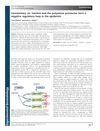N1-Methylspermidine, A Stable Spermidine Analog, Prolongs Anagen And Regulates Epithelial Stem Cell Functions In Human Hair Follicles
July 2015
in “
Archives of dermatological research
”
N1-methylspermidine spermidine anagen phase epithelial stem cells keratin K15 lactate dehydrogenase reactive oxygen species TNF-α IL-1β IL-6 keratinocytes inflammatory alopecias scalp diseases N1-MeSpd hair growth phase stem cells keratin LDH ROS tumor necrosis factor alpha interleukin-1 beta interleukin-6 skin cells hair loss scalp conditions
TLDR N1-methylspermidine helps hair growth and reduces inflammation in hair follicles.
The study demonstrated that N1-methylspermidine (N1-MeSpd), a stable analog of spermidine, effectively prolonged the anagen phase and reduced cell apoptosis in cultured human hair follicles. At a concentration of 0.5 µM, N1-MeSpd also stimulated the expression of keratin K15, associated with epithelial stem cells, and decreased lactate dehydrogenase activity, indicating reduced cell death. Additionally, N1-MeSpd diminished reactive oxygen species production and lowered the expression of inflammatory markers such as TNF-α, IL-1β, and IL-6 in keratinocytes. These findings suggested that N1-MeSpd's effects might be due to its anti-oxidative and anti-inflammatory properties, which could be beneficial for treating inflammatory alopecias and scalp diseases.










